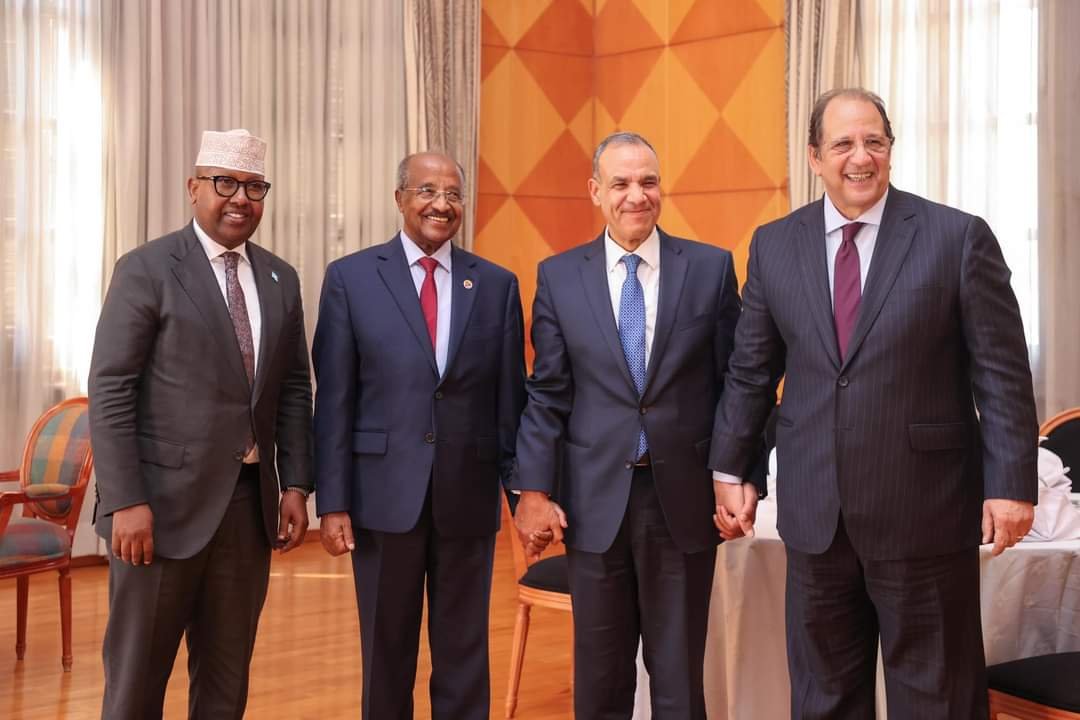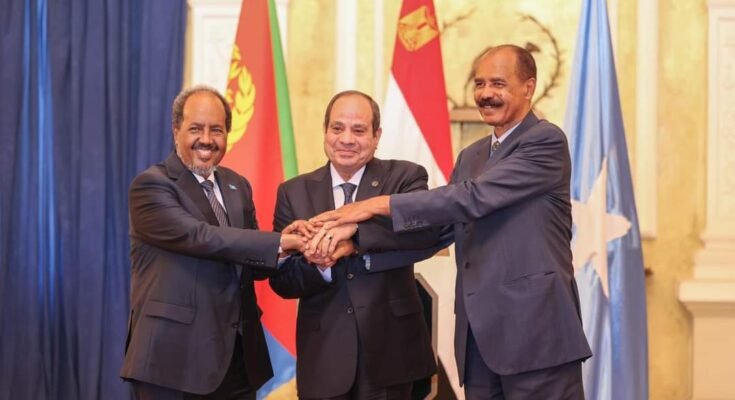Introduction to the Regional Dynamics
The Horn of Africa, a region of significant geopolitical interest, has long been characterized by complex historical tensions, particularly among Eritrea, Ethiopia, and Egypt. Ethiopia, with its dominant position, has historically influenced the political dynamics within the region, often to the detriment of its neighbors. The Ethiopian-Eritrean War, which spanned from 1998 to 2000, marked a pivotal moment in this context, solidifying deep-seated animosities and driving Eritrea to seek alliances that could counterbalance Ethiopian power.
In recent years, the collaboration between Eritrea, Egypt, and Somalia has gained prominence, driven by a myriad of shared interests. For Eritrea, maintaining sovereignty while mitigating the challenges posed by Ethiopian hegemony has become increasingly imperative. The alliance has enabled Eritrea to unite with Egypt, which is concerned about Ethiopia’s Grand Ethiopian Renaissance Dam (GERD) project that threatens its access to Nile waters—an essential resource for the nation’s survival. Somalia, facing its own threats from regional instability and extremist groups, finds common ground in these alliances as it seeks to bolster its national security and political legitimacy.
The motivations behind this strategic partnership extend beyond immediate political interests. The three nations have cultivated a sense of solidarity against perceived Ethiopian expansionism, viewing it as a threat to their territorial integrity and economic prospects. The historical conflicts have engendered a mutual understanding among Eritrea, Egypt, and Somalia of the necessity for collective action. As they navigate this intricate web of alliances, their collaboration represents not only an effort to counter Ethiopia’s growing influence but also an aspiration towards greater regional stability and cooperation.

Eritrea’s Motivations and Strategic Interests
Eritrea’s motivations for forming a strategic alliance with Egypt and Somalia against Ethiopia are deeply rooted in its historical grievances and aspirations for regional power. Following its independence from Ethiopia in 1993, Eritrea experienced a protracted border conflict with its neighbor, culminating in the second Ethiopia-Eritrea War from 1998 to 2000. This conflict not only resulted in significant loss of life but also fostered lasting animosity between the two nations. As a result, Eritrea has a vested interest in countering Ethiopia’s influence and ensuring its national security.
One of the primary motivations for Eritrea’s alignment with Egypt and Somalia lies in the quest for greater regional stability. Ethiopia’s rising military and economic capabilities pose a challenge to Eritrea, bringing forth concerns about its sovereignty and territorial integrity. By collaborating with these nations, Eritrea seeks to create a counterbalance that can deter potential threats from Ethiopia. This strategic partnership positions Eritrea to leverage Egypt’s influence over the Nile River, a critical resource for both nations, as well as Somalia’s strategic location in the Horn of Africa.
Furthermore, Eritrea is keen on enhancing its economic conditions by engaging in regional alliances that can stimulate trade and investment. The contributions from its partners can facilitate Eritrean access to markets and resources, thereby improving its economic landscape. Additionally, military cooperation with Egypt can bolster Eritrea’s defense capabilities, allowing it to reinforce its position in the precarious geopolitical environment of the region.
In summary, Eritrea’s motivations stem from a combination of historical grievances against Ethiopia, a desire for national security, and aspirations for enhanced economic and military capabilities. The alliance with Egypt and Somalia reflects Eritrea’s strategic interests in cultivating a more favorable geopolitical landscape that addresses its long-standing concerns.
Egypt’s Role and Concerns over the Nile
Egypt’s strategic partnership with Eritrea and Somalia is driven by significant concerns regarding Ethiopia’s construction of the Grand Ethiopian Renaissance Dam (GERD). Historically, Egypt has been heavily reliant on the Nile River as its primary water source, with about 95% of the country’s water supply deriving from this vital waterway. The Nile’s flow is not only crucial for domestic consumption but also for agricultural production, essential to sustain the Egyptian economy. Thus, the realization of the GERD, which Ethiopia views as pivotal for its development and hydropower generation, has raised alarms in Cairo about the potential decrease in water levels that could jeopardize Egypt’s water security.
The Grand Ethiopian Renaissance Dam is expected to significantly alter the hydrological dynamics of the Nile, and Egypt’s fears of reduced water flow have catalyzed a shift in its foreign policy, prompting it to seek alliances with regional partners. By cooperating with Eritrea and Somalia, Egypt aims to strengthen its position and engage in strategic maneuvers that could mitigate the perceived threats stemming from Ethiopia. Additionally, these partnerships serve as a means to counterbalance Ethiopian influence in the Horn of Africa.
Furthermore, Egypt’s historical narrative around the Nile has been shaped by agreements such as the 1959 Nile Water Agreement, which allocated the majority of the river’s resources to Egypt and Sudan, largely sidelining upstream nations like Ethiopia. This historical context has fueled Egypt’s motivations to secure its water interests and maintain control over the river’s resources through diplomatic and strategic channels. The deepening ties with Eritrea and Somalia underscore Egypt’s broader efforts to consolidate regional support, thereby attempting to counter Ethiopia’s advancements and preserving its longstanding rights to the Nile.
Somalia’s Role in the Alliance
Somalia’s involvement in the emerging strategic alliance with Eritrea and Egypt represents a critical turn in its foreign policy, driven primarily by its internal challenges and ongoing political instability. The quest for stability is at the forefront of Somalia’s motivations; by cementing partnerships with Eritrea and Egypt, the Somali government aims to bolster its fragile state institutions and reclaim its regional influence. These alliances may provide Somalia with necessary support, both economically and militarily, to manage insurgencies and bolster governance.
The geographical positioning of Somalia within the Horn of Africa places it at the heart of regional politics, entangled in a complex web with neighboring Ethiopia and other East African nations. The alliance with Eritrea and Egypt reflects a collective interest in countering Ethiopian dominance in the region. As Ethiopia expands its influence, Somalia seeks to align itself with countries that share its concerns over security and territorial integrity. This collaboration could significantly alter the existing power dynamics in the Horn of Africa.
The ramifications of this alliance could have far-reaching implications for the geopolitical landscape. Particularly, it could prompt a reevaluation of Ethiopia’s foreign partnerships and military strategies in response to this new coalition. Additionally, neighboring countries such as Kenya and Djibouti might feel pressured to reassess their stances amidst a shifting balance of power; they may seek to enhance their own alliances or engage in diplomatic maneuvers to mitigate perceived threats.
Ultimately, Somalia’s pursuit of alignment with Eritrea and Egypt highlights the intricate interplay of regional alliances in addressing internal and external challenges. The long-term implications for peace and security in the Horn of Africa will largely depend on the success of this strategic alliance and its ability to foster stability amid a backdrop of historical tensions and rivalry.




One Comment on “The Rising Cement Axis: Eritrea, Egypt, and Somalia’s Strategic Alliance Against Ethiopia”